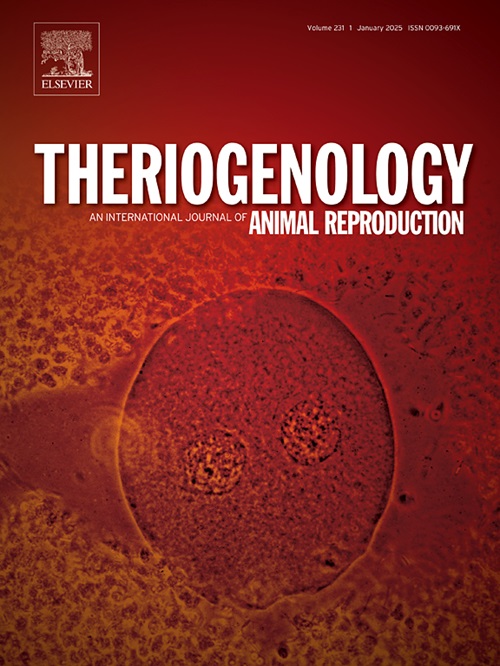Effect of in vivo and in vitro heat stress on DNA methylation and DNA hydroxymethylation of bovine oocytes and early embryos
IF 2.4
2区 农林科学
Q3 REPRODUCTIVE BIOLOGY
引用次数: 0
Abstract
In the bovine commercial industry, reduced reproductive performance in response to heat stress is one of the main factors causing economic losses. Several studies have shown that heat stress negatively affects oocytes and embryos at the morphological, biochemical, transcriptional, and developmental levels. Yet, there is limited information on the effect of heat stress on the epigenetic modifications of bovine oocytes and embryos. Therefore, the objective of this study was to evaluate the effect of in vivo and in vitro heat stress on the developmental competence, DNA methylation, and DNA hydroxymethylation of bovine oocytes and early embryos. Oocytes were collected through ovum pick-up from non-lactating, non-pregnant Bos taurus beef cows in February and August under Louisiana environmental conditions. The treatments evaluated were: in vivo heat stress (oocytes collected in August), in vitro heat stress (oocytes collected in February and subjected to in vitro heat stress), and control (oocytes collected in February and not subjected to in vitro heat stress). Developmental rates, DNA methylation and DNA hydroxymethylation of metaphase II oocytes (MII), 2-pronucleus embryos (2 PN) and 2–4 cell embryos were evaluated. Global DNA methylation and DNA hydroxymethylation were evaluated through fluorescence immunostaining. No differences between treatments was detected in developmental rates of MII oocytes, 2 PN embryos and 2–4 cell embryos. Similarly, no differences between treatments was detected in global DNA methylation and DNA hydroxymethylation of MII oocytes, 2 PN embryos, and 2–4 cell embryos. Importantly, no differences in global DNA methylation or DNA hydroxymethylation of paternal or maternal pronucleus was detected, indicating that the demethylation process during the 2 PN embryo stage was not altered at the global level. The results of our study showed that under our experimental conditions, in vivo and in vitro heat stress did not affect developmental rates, DNA methylation and DNA hydroxymethylation of MII oocytes and early embryos produced from oocytes obtained from non-lactating, non-pregnant Bos taurus beef cows.
体内和体外热应激对牛卵母细胞和早期胚胎DNA甲基化和羟甲基化的影响
在牛商业工业中,热应激导致的繁殖性能下降是造成经济损失的主要因素之一。一些研究表明,热应激在形态、生化、转录和发育水平上对卵母细胞和胚胎产生负面影响。然而,关于热应激对牛卵母细胞和胚胎表观遗传修饰的影响的信息有限。因此,本研究旨在探讨体内和体外热应激对牛卵母细胞和早期胚胎发育能力、DNA甲基化和DNA羟甲基化的影响。本研究于2月和8月在路易斯安那州环境条件下,通过取卵方法采集非哺乳期、非妊娠牛的卵母细胞。评估的处理方法为:体内热应激(8月份采集的卵母细胞)、体外热应激(2月份采集的卵母细胞并进行体外热应激)和对照组(2月份采集的卵母细胞未进行体外热应激)。测定中期卵母细胞(MII)、2-原核胚胎(2 - PN)和2- 4细胞胚胎的发育率、DNA甲基化和DNA羟甲基化。荧光免疫染色法检测小鼠整体DNA甲基化和DNA羟甲基化。MII卵母细胞、2 - PN胚胎和2 - 4细胞胚胎的发育率在不同处理间无差异。同样,在MII卵母细胞、2 - PN胚胎和2 - 4细胞胚胎的总体DNA甲基化和DNA羟甲基化方面,处理之间没有发现差异。重要的是,父本和母本原核的整体DNA甲基化和DNA羟甲基化没有差异,这表明2 PN胚胎阶段的去甲基化过程在整体水平上没有改变。我们的研究结果表明,在我们的实验条件下,体内和体外热应激不影响MII卵母细胞的发育率、DNA甲基化和DNA羟甲基化,也不影响非哺乳期、非妊娠期牛牛卵母细胞产生的早期胚胎。
本文章由计算机程序翻译,如有差异,请以英文原文为准。
求助全文
约1分钟内获得全文
求助全文
来源期刊

Theriogenology
农林科学-生殖生物学
CiteScore
5.50
自引率
14.30%
发文量
387
审稿时长
72 days
期刊介绍:
Theriogenology provides an international forum for researchers, clinicians, and industry professionals in animal reproductive biology. This acclaimed journal publishes articles on a wide range of topics in reproductive and developmental biology, of domestic mammal, avian, and aquatic species as well as wild species which are the object of veterinary care in research or conservation programs.
 求助内容:
求助内容: 应助结果提醒方式:
应助结果提醒方式:


